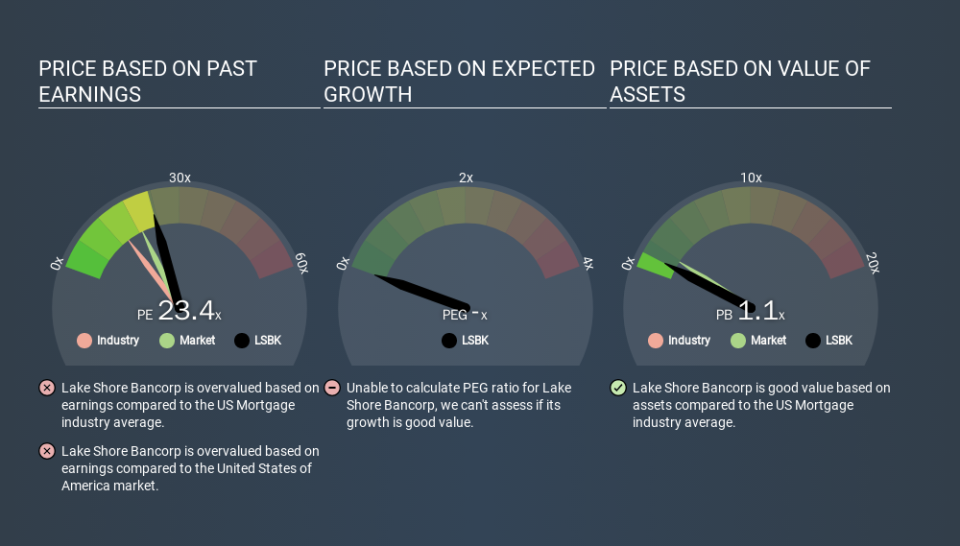Here's How P/E Ratios Can Help Us Understand Lake Shore Bancorp, Inc. (NASDAQ:LSBK)

Lake Shore Bancorp (NASDAQ:LSBK) shares have retraced a considerable in the last month, but the stock is still up slightly on where it started the quarter. Zooming out, the recent drop wiped out a year's worth of gains, with the share price now back where it was a year ago.
All else being equal, a sharp share price increase should make a stock less attractive to potential investors. While the market sentiment towards a stock is very changeable, in the long run, the share price will tend to move in the same direction as earnings per share. So some would prefer to hold off buying when there is a lot of optimism towards a stock. One way to gauge market expectations of a stock is to look at its Price to Earnings Ratio (PE Ratio). A high P/E ratio means that investors have a high expectation about future growth, while a low P/E ratio means they have low expectations about future growth.
View our latest analysis for Lake Shore Bancorp
Does Lake Shore Bancorp Have A Relatively High Or Low P/E For Its Industry?
We can tell from its P/E ratio of 23.45 that there is some investor optimism about Lake Shore Bancorp. As you can see below, Lake Shore Bancorp has a higher P/E than the average company (14.2) in the mortgage industry.
Its relatively high P/E ratio indicates that Lake Shore Bancorp shareholders think it will perform better than other companies in its industry classification. The market is optimistic about the future, but that doesn't guarantee future growth. So further research is always essential. I often monitor director buying and selling.
How Growth Rates Impact P/E Ratios
Companies that shrink earnings per share quickly will rapidly decrease the 'E' in the equation. That means unless the share price falls, the P/E will increase in a few years. So while a stock may look cheap based on past earnings, it could be expensive based on future earnings.
Lake Shore Bancorp increased earnings per share by an impressive 11% over the last twelve months. And it has bolstered its earnings per share by 1.7% per year over the last five years. This could arguably justify a relatively high P/E ratio. In contrast, EPS has decreased by 2.6%, annually, over 3 years.
Remember: P/E Ratios Don't Consider The Balance Sheet
It's important to note that the P/E ratio considers the market capitalization, not the enterprise value. In other words, it does not consider any debt or cash that the company may have on the balance sheet. Theoretically, a business can improve its earnings (and produce a lower P/E in the future) by investing in growth. That means taking on debt (or spending its cash).
Such spending might be good or bad, overall, but the key point here is that you need to look at debt to understand the P/E ratio in context.
So What Does Lake Shore Bancorp's Balance Sheet Tell Us?
Lake Shore Bancorp has net debt worth 16% of its market capitalization. This could bring some additional risk, and reduce the number of investment options for management; worth remembering if you compare its P/E to businesses without debt.
The Verdict On Lake Shore Bancorp's P/E Ratio
Lake Shore Bancorp's P/E is 23.4 which is above average (18.9) in its market. While the company does use modest debt, its recent earnings growth is very good. Therefore, it's not particularly surprising that it has a above average P/E ratio. Given Lake Shore Bancorp's P/E ratio has declined from 23.4 to 23.4 in the last month, we know for sure that the market is less confident about the business today, than it was back then. For those who prefer to invest with the flow of momentum, that might be a bad sign, but for a contrarian, it may signal opportunity.
Investors have an opportunity when market expectations about a stock are wrong. As value investor Benjamin Graham famously said, 'In the short run, the market is a voting machine but in the long run, it is a weighing machine. We don't have analyst forecasts, but you could get a better understanding of its growth by checking out this more detailed historical graph of earnings, revenue and cash flow.
You might be able to find a better buy than Lake Shore Bancorp. If you want a selection of possible winners, check out this free list of interesting companies that trade on a P/E below 20 (but have proven they can grow earnings).
If you spot an error that warrants correction, please contact the editor at editorial-team@simplywallst.com. This article by Simply Wall St is general in nature. It does not constitute a recommendation to buy or sell any stock, and does not take account of your objectives, or your financial situation. Simply Wall St has no position in the stocks mentioned.
We aim to bring you long-term focused research analysis driven by fundamental data. Note that our analysis may not factor in the latest price-sensitive company announcements or qualitative material. Thank you for reading.

